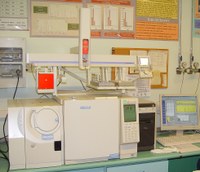Environmental Pollution Control Laboratory
m.carmen.gutierrez@upc.edu
Phone number: +34 93 739 80 08
Presentation

Appropriate equipment to realize all kinds of chemical analyses and microbiological determinations that since 1986 have allowed it to function as an auxiliary Laboratory of the Catalan Water Agency. It also has pilot plants for biological or physicochemical depuration.
Analysis in general
Validation of cations by atomic absorption. Anions evaluation. Fats and oils. Organic and total carbonic. Acidity/alkalinity. Ammoniac and total nitrogen. Phosphorus, nitrites and nitrates, sulphides, etc.
Industrial water
Colour. Conductivity. Dry residue and suspended solids, turbidity. Hardness. Dissolved oxygen. Pathogenic microorganisms. Presence of the most frequent pollutants, TA and TAC, chlorides and sulphates.
Residual waters
DBO and DQO. Decanted volume of sludge. Inhibitory substances, MES, conductivity. Organic metal components. Total microorganisms: fungi, streptococcus, clostridia, coliforms.
Pollution produced in a textile process.
Residual waters depuration. Physicochemical processes, neutralization, decantation, filtration, absorption (active coal or resins)
Oxidation processes.
Biological depurations: Anaerobic and aerobic processes. Selection of specific microorganisms. Activated sludge. Percolating filters. O2 consumption rate.
Conduction of depurations stations. Planning. Test in pilot plant. Inhibitor effect of some effluents. Recycling of effluents once treated.
Various textile essays
Microbiological test on tissue or raw materials.
Evaluation of finishes and additives: urea/formalin, fungicides, antimicrobials. Imputrescibility.
Biodegradability of chemicals. Recovery of residual dyes by tangential microfiltration.
Active matter of textile auxiliaries.
Safety sheets.
Identification of the causes of bad smells on tissues by CG-MS.
Courses
Pollution control in textile and chemical industry.
Microbiological control of activated sludge.
Course about solid-liquid separation techniques applied to wastewater treatment.
Course about separation techniques about mineral membranes.
Lines R+D
Environmental engineering.
Physic-chemical and biological processes.
Chemical and microbiological analyses of wastewater and process water.
Raw material control used in the textile and chemical industry on textile articles.
Reuse and recycling of industrial effluents.
Share: